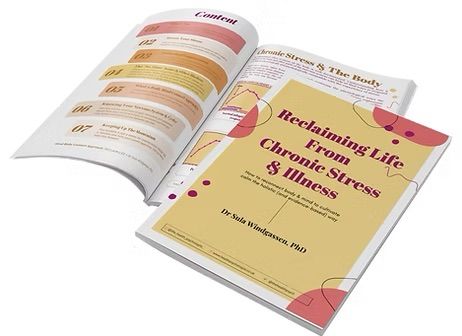How Stress Impacts Your Health and How to Better Manage It
Jun 19
/
Dr Sula Windgassen
If you're living with a chronic condition like endometriosis, IBS, or chronic fatigue, you may have been told to 'just manage your stress.' as a solution to dealing with your symptoms - which is understandably frustrating. Often, we have a fear of stress and the impact it has on us, because we know some of the impact it can have on our health.
But understanding how to reduce that fear of stress and how it can impact your health through the mind-body connection can help to transform how you approach stress management and support yourself whilst dealing with a chronic condition.
"Just manage your stress better"
Whether it is the doctor telling you to ‘manage stress’ or the internet showing you ways to regulate your nervous system, there is a lot of information out there that can make you feel stressed about getting stressed. This becomes a bit of a vicious cycle that traps you in an ongoing state of stress.
Here’s the thing: Your expectations of what managing stress looks like, might be putting more pressure on you than it is helping you. To take that pressure off and give you some low intensity ways of working with stress that you can integrate into your day to day to reduce the impact of stress on health, we’re going to start by considering what we even mean by stress.
Stress is not one thing but three.
Stress can be:
- A stressor: something that causes you stress e.g. a deadline or physical symptoms
- A stress reaction/experience: A psychological and/or physiological state of stress that is a natural reaction to a stressor. You can experience a physiological reaction to stress without feeling psychologically stressed but generally, you will always have some physiological reaction when you feel psychologically stressed.
- A stress response: What you do in response to the stressor. This might be something like worrying, or focussing in on the issue or pacing about.
If you try to avoid or minimise 1 and 2, you end up in these vicious stress cycles generally. That’s because they are often uncontrollable. Or sometimes you can avoid stressors but it would not be advisable e.g. avoiding going to the doctor when you have symptoms because the consultation stresses you out. Not going can cause more issues.
Number 3 is where we can do some work. And let’s address those eager to elevate expectations once more! You don’t need to always respond perfectly to stress. Far from it. You just need to have awareness, the ability to reflect, the intention to try alternative strategies and the opportunity to repeat alternative strategies. This builds stress habits that are good for you and intrinsically regulating.
Is stress good for your health?
This is a good point to raise - because there are two types of stress. There is acute stress, which occurs suddenly and stops quickly, and chronic stress which is longer lasting.
The right amount of stress is actually good for your health. Not just good for it, but necessary for you to maintain health [1]. When you are challenged, when you feel the rise of adrenaline, your body is adept to accommodate it. If you can work with it, by embracing the shifts, allowing not resisting and then supporting readjustment using the suggestions above, you are positively impacting your health.
But when stress becomes chronic (when the stress exceeds the resources we have within us to cope), it then becomes negative and can impact our physical and mental health in a range of ways.
The right amount of stress is actually good for your health. Not just good for it, but necessary for you to maintain health [1]. When you are challenged, when you feel the rise of adrenaline, your body is adept to accommodate it. If you can work with it, by embracing the shifts, allowing not resisting and then supporting readjustment using the suggestions above, you are positively impacting your health.
But when stress becomes chronic (when the stress exceeds the resources we have within us to cope), it then becomes negative and can impact our physical and mental health in a range of ways.
What are good stress habits for improved health?
They are much simpler and perhaps less intensive than you may expect, but they take time to practice. They are built on a foundation of something called ‘interoceptive awareness’. This is your ability to detect and process internal bodily signals. When you have a high level of stress and a high level of physical discomfort from symptoms, interoceptive awareness can get disrupted. It can mean you end up more hypervigilant and your body more reactive [2], [3]. So to help mind and body maintain an equilibrium, we need to address that. Here are the cornerstones:
Awareness and observation of physiological changes in your nervous system state in response to different demands
There are three broad modes your body has in response to stress, with underlying physiological changes: activated when highly alert, deactivated, when you are impeded from activating – perhaps from too much stress and balance, when you can be at ease and responsive if needed but content to be at rest. These states are like a spectrum. You can fall in between them and move across them quickly. The first step is recognising what they feel like physiologically.
Increasing your ability to regulate these nervous system states
To begin with you just observe what each state feels like physically and emotionally in your body. When you have familiarity, you can play around with regulating these states. Breathing and somatic practices can help with this. Check out the resource hub for practices to help you.
Taking emphasis off stress and tethering to regulating pursuits
We can have the intuitive assumption that to feel better when stressed, we simply need the stressor to be gone or over. The problem is this isn’t always an option. It’s therefore important to build the skill of being able to detach from the stressor, which your brain and body may automatically be processing as a threat [24], and directing attention and energy towards more regulating pursuits. They might be things that channel the emotion, calm it, give you meaning or simply distract you.
Recognising when mind and body are at odds and finding a compromise
Your ‘cognitive brain’ – that is the brain processes that do a lot of thinking often run the show. When you are thinking of your to do list, wondering about things, planning, analysing and remembering – this is the cognitive brain in action. Super helpful. The problem is, it can dominate so that you become less aware of important emotions and physiological experiences at times where it is important for you to be aware of them. An example is staying up late to watch TV or scroll social media, even though your body needs sleep and you’re not feeling particularly engaged. Or pushing yourself beyond your capacity at work so that you end up with a headache later because you thought you would feel more relieved if you got that piece of work finished before the end of the day.
Here's where interoceptive awareness comes in again. You need to level the playing field so that you make more space to hear from your feelings physically and emotionally. This is longer term work and can feel scary - especially if you have no strategies for actively coping with emotions that are not solely focussed on getting rid of them.
TLDR?
The bottom line: Stress is not just one thing, It's a stressor (what happens), your reaction (how your body responds), and your response (what you do about it). You cannot always control the first two, but you can work with the third.
Some key takeaways:
A good starting point? Begin by observing how stress feels in your body without trying to fix it immediately or panicking about feeling stress. Building awareness is an important step towards better stress management with chronic conditions.
Remember: You do not need to respond perfectly to stress every time, this is not another thing to strive for perfection on. Progress comes from awareness, reflection and gradually building healthier stress responses that work with your body-mind connection, not against it. Small steps lead to bigger things!
Some key takeaways:
- Stop trying to avoid all stress - some stress is good for your health
- Focus on building stress habits through awareness of your nervous system states
- Practice interoceptive awareness - tuning into what your body is actually telling you
- Find a compromise between your thinking brain and your body's needs
- Use breathing and somatic practices to regulate your nervous system response
A good starting point? Begin by observing how stress feels in your body without trying to fix it immediately or panicking about feeling stress. Building awareness is an important step towards better stress management with chronic conditions.
Remember: You do not need to respond perfectly to stress every time, this is not another thing to strive for perfection on. Progress comes from awareness, reflection and gradually building healthier stress responses that work with your body-mind connection, not against it. Small steps lead to bigger things!
Want to learn more? Download our free workbook

Thank you! You will now be redirected to download your copy.
References:
[1] B. S. McEwen, ‘Stress, adaptation, and disease. Allostasis and allostatic load’, Ann N Y Acad Sci, vol. 840, pp. 33–44, May 1998, doi: 10.1111/j.1749-6632.1998.tb09546.x.
[1] B. S. McEwen, ‘Stress, adaptation, and disease. Allostasis and allostatic load’, Ann N Y Acad Sci, vol. 840, pp. 33–44, May 1998, doi: 10.1111/j.1749-6632.1998.tb09546.x.
[2] B. R. Cornwell, M. I. Garrido, C. Overstreet, D. S. Pine, and C. Grillon, 'The Unpredictive Brain Under Threat: A Neurocomputational Account of Anxious Hypervigilance', Biological Psychiatry, vol. 82, no. 6, pp. 447–454, Sep. 2017, doi: 10.1016/j.biopsych.2017.06.031.
[3] A. J. Crum, Akinola ,Modupe, Martin ,Ashley, and S. and Fath, 'The role of stress mindset in shaping cognitive, emotional, and physiological responses to challenging and threatening stress', Anxiety, Stress, & Coping, vol. 30, no. 4, pp. 379–395, Jul. 2017, doi: 10.1080/10615806.2016.1275585.
About Dr Sula Windgassen, PhD
Dr Sula is a Health Psychologist, Cognitive Behavioural Therapist, Eye Movement Desensitisation & Reprocessing (EMDR) Therapist and Mindfulness Teacher. Trained at King's College London & publishing papers on the use of psychology to improve health and whole-person wellbeing.
Featured links
Copyright © 2025

